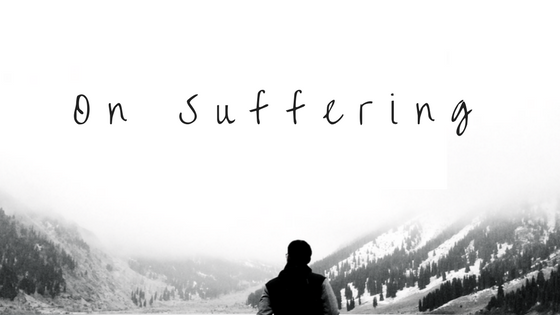On Suffering
“So do not fear, for I am with you; do not be dismayed, for I am your God. I will strengthen you and help you; I will uphold you with my righteous right hand.”
Isaiah 41:10 (NIV)
There is supposed to be joy in the waiting, hope in tomorrow, prayers answered with the dawning of a new day. Sometimes that is true. Other times those aphorisms can feel insulting to your mind and heart as you hold up your empty hands to God. It is easy to speak the words of promise and comfort the Bible offers us, but it is much harder to accept them when they do not feel true. It can be easy to pray; other times, the prayers just do not come.
Perhaps one of the ultimate examples of this no man’s land between hope and hopelessness is sickness, or suffering. Sickness and suffering should, by all rights, be for adults only, if they must exist at all. As parents, we pray and hope that our children will be spared those things. Sometimes—and I know there are those among us who know this to be true—the sickness and suffering are in our children, and that is a unique, indescribable pain. Other times, our children are healthy, watching us as we navigate suffering, either in ourselves or in those we love. There are lessons there, always lessons, and in suffering and sickness, those lessons are some of the most important ones we can teach our children.
We know the words: Cancer. Terminal. We are sorry. Wait and hope. Other times the words are less widely known, words like chromosomal abnormality, hyperemesis gravidarum, and ankylosing spondylitis. Sometimes they are private, words like miscarriage. Stigmatizing, sometimes, misunderstood, like bipolar disorder or schizophrenia. In our lives and families, we have our words; our words and names of suffering, of illness, of agony, and of loss. As Christians, we are supposed to also have the words to pray, the words to ask for joy anyway.
Yet, we are human. We feel pain. We feel loss. We feel the earth-shattering agony of heartbreak. We feel that urge to tell a Christian offering us comfort in the Lord to move on, save it. We can slam our Bibles shut in anger. We can demand to know why, to shout in disappointment, to ask where God was, what better things did He have to do that day?
Friends, I have been there. I have asked God where He was. I have wondered why, God Almighty, me? And I know that there are those of you who have been there too, those of you who are there right now with questions, with diagnoses, with pain so deep in your heart that you wonder whether it will just stop beating from the sadness of it all.
God never expects us to be immune to pain, to pretend it isn’t happening, to fake happiness when we are grieving. He gave us tears to shed. He made us with the full capacity to feel the physical and invisible pains of the human experience. He made us human.
In the suffering, in the waiting, there are lessons so beautiful, so important, that they must sear and hurt and bruise to learn. They are lessons of answered prayers that look different from the answers we were hoping for. Sometimes it takes a lifetime to realize you were born for exactly this life, that God knew what you could carry and nothing more. We miss. We long for. We carry scars on our heavy hearts.
In the waiting we learn faith. We learn hope. We learn gratitude. We learn the lessons of pain and suffering. Somewhere in the midst of if it all we learn who God is in a way we just could not comprehend before. As Pastor Tim Keller wrote, “You don’t really know Jesus is all you need until Jesus is all you have.” (Walking with God Through Pain and Suffering, 5)
This will not wrap up neatly with a bow of aphorisms. No, those tend to hurt more than help. Rather, I turn to Keller again, to remind us of the uniquely Christian view of suffering:
“Christianity teaches that, contra fatalism, suffering is overwhelming; contra Buddhism, suffering is real; contra karma, suffering is often unfair; but contra secularism, suffering is meaningful. There is a purpose to it, and if faced rightly, it can drive us like a nail deep into the love of God and into more stability and spiritual power than you can imagine.” (30)
And when your children turn to you, ready for the lessons, give them more than the aphorisms, too. Give them a God who knows our agonies and remembers our names.
In the suffering, feel your pain. Let the tears fall. Try your best to pray, to lift your eyes to God, of course, but remember, too, that pain is part of our experience, and it can leave us so broken that words fail us. It shatters us, it hurts and aches. Hold on in those moments and know that they are a nail driven deep, deep into a love that runs even deeper.

